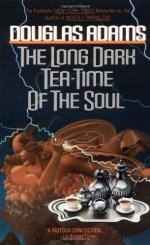|
This section contains 635 words (approx. 3 pages at 300 words per page) |

|
Tea is the most widely consumed beverage in the world, except for water, and provides over 40 percent of the world's dietary CAFFEINE. In the United States, caffeine from tea accounts for about 17 percent of caffeine consumed; per capita caffeine consumption from tea is about 35 milligrams per day, which is a little over one-third of the daily caffeine provided by coffee beverages. Tea consumption in the United Kingdom is substantially higher, averaging 320 milligrams per capita per day and accounting for 72 percent of the United Kingdom's caffeine consumption.
Although tea contains a large number of chemical compounds, the relatively high content of polyphenols and caffeine is responsible for tea's pharmacological effects. The primary psychoactive component of tea is caffeine. Tea also contains two compounds that are structurally related to caffeine, theophylline and THEOBROMINE, however, these compounds are found in relatively insignificant amounts. On average, a 6-ounce (177-milliliter) cup of leaf...
|
This section contains 635 words (approx. 3 pages at 300 words per page) |

|


